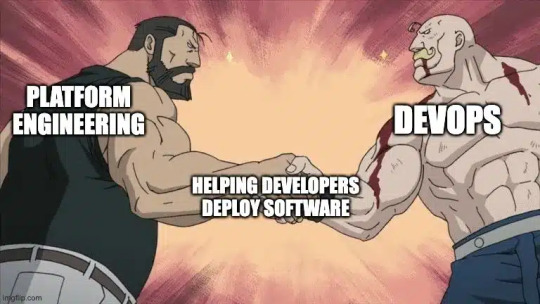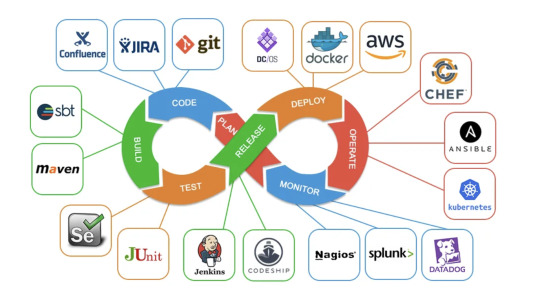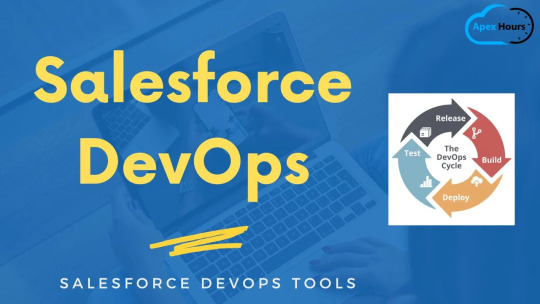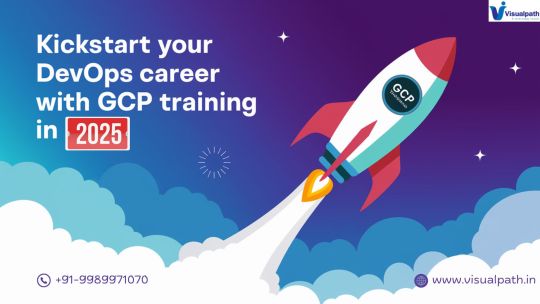#DevOps Platform
Explore tagged Tumblr posts
Text
AIOps for DevOps. This is a phrase that you’ll hear a lot often in the coming years. Leveraging AIOps is becoming an emerging practice for DevOps. And why not? After all, AIOps offers so many benefits for DevOps, making it a must have for every business.
1 note
·
View note
Text
Senior Asset Engineer (Support)
Job title: Senior Asset Engineer (Support) Company: Network Rail Job description: technical engineering input, support and advice across a designated engineering discipline. Our senior blocket engineers lead… advice, support and input to technical accident and incident investigations. 4. Support the setting of policy and standards… Expected salary: £55596 – 62546 per year Location: Birmingham Job…
#agritech#Automotive#Bioinformatics#Broadcast#computer-vision#data-engineering#deep-learning#DevOps#embedded-systems#ethical AI#ethical-hacking#gcp#HPC#it-consulting#legaltech#Machine learning#metaverse#mlops#NLP#power-platform#project-management#remote-jobs#rpa#scrum#SEO#Technical Product Manager#uk-jobs#ux-design#vr-ar
0 notes
Text
How to Give Your IoT Device a Public URL (for Any IoT Platform) with Tunnelmole
Expose your IoT device to the internet in minutes with Tunnelmole! Open source, free, works on Pi & more. Guide: https://softwareengineeringstandard.com/2025/07/04/how-to-give-your-iot-device-a-public-url-for-any-iot-platform-with-tunnelmole/ #iotplatform #iot #opensource
https://softwareengineeringstandard.com/2025/07/04/how-to-give-your-iot-device-a-public-url-for-any-iot-platform-with-tunnelmole/
#iot platform#iot#platform#opensource#javascript#typescript#python#programming#coding#raspberrypi#tunneling#networking#webhooks#nodejs#linux#automation#cloud#devops
0 notes
Text
How to Pick a Tech PR Agency That’s Your Perfect Match

Picking a PR agency for your tech company is like choosing your go-to partner for a big night out, you need someone who vibes with your energy, hypes you up to the crowd, and makes sure everyone’s buzzing about you by morning. In the tech world, where startups pop off like viral TikToks and trends flip faster than a Reels dance-off, a great PR agency can turn your brand into the one everyone’s obsessed with. Pick a dud, though, and you’re stuck with an empty wallet and a vibe that’s straight-up flat. So, how do you find the agency that’s your crew? Here’s a real, no-BS, straight-from-the-heart checklist, with a massive shoutout to why 9FigureMedia’s absolutely owning the game in 2025.
1. They’re All About Your Tech Life

Tech’s not just a job, it’s a whole lifestyle. Whether you’re building AI that’s sharper than your group chat’s memes, slinging fintech apps, or dreaming up some wild new gadget for the metaverse, your agency needs to be head-over-heels for your niche. They should know what keeps your customers up at night, how your rivals are throwing shade, and why your product’s the one everyone’s gotta have. Scroll through their wins: Have they worked with folks like you? Do their stories, like scoring a TechCrunch feature or getting investors hyped make you go, “Yo, that’s my kind of party”?
9FigureMedia is like that friend who’s always one step ahead, geeking out over SaaS, crypto, or health tech. They’ve landed clients in Forbes, Wired, the big leagues, with campaigns that don’t just make noise, they make your brand the one everyone’s got on their mind.
2. They’ve Got the Ultimate Hookups
PR’s all about who’s in your squad. A great agency has pals at The Verge, VentureBeat, or that blog your audience can’t stop scrolling. Those connections mean your story lands with the right crowd, not lost in some editor’s spam folder. Ask them: Who’s in your circle? Can you spill the tea on a time you scored a client a big feature? You want an agency with a network that’s like a VIP pass to the cool kids’ club.
9FigureMedia’s got the plug. They’re tight with journalists who live for your industry, making sure your story hits the right desks. It’s not about spamming inboxes, it’s about knowing who to text for that front-page glow-up.
3. They Tell Your Story Like It’s Theirs
Tech can be a total snooze to outsiders, but a great agency makes your nerdy innovation feel like a Netflix banger. They should turn your code or gadget into a story that hooks journalists, investors, and even your skeptical auntie. Look for a team that pumps out blogs, customer stories, or hot takes that sound like you, not some stiff corporate email. They need to dive into your business and find the juice, maybe your startup’s scrappy heart or a product that’s flipping the game.
9FigureMedia’s storytelling is straight-up fire. They don’t just push out boring press releases; they hang with you, get what makes your brand pop, and craft stories that hit you right in the feels. Startup hustle or big company flex, they make it real and electric.
4. They Can Handle the Hot Mess
Tech’s a rollercoaster. A buggy launch, an X pile-on, or a security slip can tank your rep faster than you can say “refresh.” Your agency needs a plan for when things get messy, a clear, honest talk that keeps you looking legit. Ask: How do you handle the drama? Got any stories of saving a client’s skin? You want a team that stays chill and keeps your brand’s trust locked down.
5. They Show You the Goods
PR’s not just about good vibes. it’s about results you can flex. A great agency sets clear goals, like “we’ll land you in five tech outlets in three months” or “we’ll boost your site traffic by 20%.” They should also share reports that lay it out: how many folks saw your story, how you’re holding up against rivals, or if your brand’s getting more love. Ask to see their reports, what���s the tea?
9FigureMedia keeps it 100. They hand you no-fluff reports showing what’s popping, from media hits to website clicks. You’ll know your PR cash is actually working, not just disappearing into the void.
6. They’re Digital Rockstars
In 2025, PR and digital marketing are like Tea and Bread you can’t have one without the other. Your PR agency should know how to make your story shine online. Ask: How do you mix PR with digital? Can you help me climb search rankings? You want a team that’s got game in both worlds.
9FigureMedia’s got this on lock. They blend old-school PR with digital tricks like SEO and social hype, turning media wins into long-term online cred. Their campaigns don’t just get you in the news they help you run the internet.
7. They Feel Like Your Besties

Your agency shouldn’t feel like some random hire. They need to get your brand’s heart, your goals, your whole deal. When you chat, do they ask real questions about your business? Are they hyped about what you’re building? Ditch the agencies with cookie-cutter pitches. You want a partner who builds a plan that’s all you.
9FigureMedia’s like your work bestie. They take the time to get your brand’s soul, crafting campaigns that feel like you. Startup grinding for cash or big players staying on top, they’re right there with you, cheering you on.
8. They’ve Got the Stories to Prove It
Experience is everything. Ask for stories of clients like you, same size, same industry, same dreams. Have they helped a tiny startup break out or a big company launch something huge? Their past wins should match what you’re chasing, whether it’s buzz, leads, or cred.
9FigureMedia’s got a stack of wins. They’ve worked with everyone from scrappy startups to global tech giants, killing it in AI, fintech, and more. Their results show they can vibe with your goals, big or small.
9. They’re Real People You Can Text
The team behind the agency is everything. Who’s running your show? Are they tech nerds who get it, or are you stuck with the rookie? You want a team that’s easy to hit up, quick to reply, and feels like part of your squad. Ask about their crew, who are they, and what’s their story?
10. They Work with Your Cash
PR can hit your wallet like a bad night at the club, from “I can swing it” to “I need a side hustle.” Be clear about your budget and ask for a clear rundown of what you would be getting. Cheap can mean sketchy, but pricey doesn’t always mean better. Look for value and results that make the cost worth it. A great agency will build a plan that fits your goals and your bank account.
9FigureMedia’s got your back with options, from quick campaigns to long-term deals, so you get a big impact without going broke. They’re all about results, so your investment feels like a win, not a gamble.
Finding the right tech PR agency is all about finding the right partner who gets your brand strategy, tells your story, and delivers results you can shout about from the rooftops. Look for expertise, connections, and a team that feels like your people. 9FigureMedia’s a prime example, with a knack for turning tech brands into superstars. Use this checklist to find your match, and get ready to light up the tech scene like nobody’s business.
#business#entrepreneur#9figuremedia#global#technology#tech#smart tech#techinnovation#computing#phones#electronics#pr agency#viral#globalimpactaward#foryoupage#fyp#trending#viralpost#viral trends#viral video#saas#saas development company#saas technology#b2b saas#saas platform#software#information technology#digital transformation#innovation#devops
0 notes
Text
What Is Harness in DevOps? A Game-Changer for Continuous Delivery and Deployment- OpsNexa!
Learn about Harness in DevOps and how it automates the continuous delivery and integration process. What Is Harness in DevOps? Discover the key features of Harness, including automated deployments, verification, and monitoring, and understand how it simplifies DevOps workflows and accelerates software delivery.
#Harness DevOps#Harness CI/CD Tool#Harness Deployment Automation#DevOps Automation Platform#Continuous Delivery with Harness
0 notes
Text
Platform Engineering Vs Devops: Difference In 2025

Let’s start with DevOps, the buzzword that changed how we think about building and shipping software. These days, every college student and other professional wants to become a DevOps engineer. If you are an aspiring DevOps engineer or already working as a DevOps engineer, this blog will help you understand the difference between Platform engineering and Devops
Platform engineering is really changing every company’s perspective on developing platforms. These days, every company has started building its own internal developer platform (IDP). Let’s see why platform engineering is so important and whether platform engineering is replacing DevOps.
What is DevOps?
If you see the definition of DevOps online, this is what you get to see:
“DevOps is the combination of cultural philosophies, practices, and tools that increases an organization’s ability to deliver applications and services at high velocity.”
The goal? To shorten the software development life cycle and deliver high-quality software quickly and reliably. It’s all about collaboration, automation, and breaking down silos between teams.
But DevOps isn’t just about tools. It’s about people working together, sharing responsibility for building, testing, and releasing code. Think of it as a bridge that connects development and operations, powered by automation and transparency.
Now let’s come to our hero.

What is Platform Engineering?
Platform engineering focuses on designing, building, and maintaining the internal platforms that software teams use to build, test, deploy, and operate applications. These platforms aim to make developers’ lives easier by providing self-service tools, infrastructure as code, automation, and standardized processes.
If DevOps is the bridge, platform engineering is like building a really smart highway system on top of it.
Imagine you’re a developer. Instead of dealing with infrastructure headaches every time you want to deploy something, a platform engineer has already built you a “golden path”—a toolkit that lets you focus on your code and ship it faster (and safer).
For example, if you are a developer who needs access to a K8s cluster, instead of waiting for DevOps team or your manager to give you access, imagine if there is a platform (Internal Developer platform) where you can self-provision everything without needing to wait for anyone. How cool is this, right?
How are Platform Engineering and DevOps Different?
At a first glance, DevOps and platform engineering can look pretty similar—they both want to speed up delivery, improve collaboration, and automate all the things. But here’s the big difference:
DevOps is a set of practices and a cultural movement. It encourages developers and operations to work together, adopt automation, and own the entire lifecycle.
Platform Engineering is about productizing infrastructure and tooling. Platform engineers build the reusable platforms, paved roads, and self-service portals that enable DevOps to scale across a company.
How to Get Started with DevOps?
To be honest, the answer will differ. From a company perspective, they may already be implementing DevOps and have DevOps engineers in place. But if you are someone new to DevOps and want to start learning, here’s how you can begin:
First, start with containers and try to containerize your application. Once you are familiar with containerization technology, learn CI/CD. Then, start using any of the popular cloud platforms to deploy your application. Finally, explore Kubernetes. These are tools in DevOps, but you don’t need to learn every tool—focus on learning the technology behind them.
For example, learn containerization technology first before diving into Docker or Podman. The same applies to all tools: understand the underlying technology first, then use the tools.
How to Get Started with Platform Engineering?
I know everyone has this question: How do I get started with Platform Engineering? My first recommendation is to use tools that provide platforms or help in building platforms. This will give you a better understanding of how platform engineering works. Learning theory, like reading this blog, is fine, but try using tools that are useful for building platforms. There are many tools on the market, like Backstage, and the most popular tool I would recommend is Crossplane. Use these tools and then analyze how they can be used to build platforms that solve the internal issues developers are currently facing.
Also, join the Platform Engineering community. The CNCF has a dedicated working group for Platform Engineering. You can join the community and learn how others are building platforms.
How to Implement DevOps

How to Implement Platform Engineering
Understand Developer Needs: Interview your dev teams. What slows them down? What do they need to move faster?
Design for Self-Service: Build tools and platforms that let developers help themselves.
Standardize and Automate: Use Infrastructure as Code (IaC), CI/CD pipelines, and reusable modules.
Feedback Loop: Keep talking to your users (the devs) and keep improving the platform.
Measure Success: Track adoption, developer satisfaction, and the time it takes to deliver features.
Is Platform Engineering Replacing DevOps?

It’s a question a lot of people are asking as platform engineering gains popularity: Is platform engineering replacing DevOps?
The short answer is no platform engineering is not replacing DevOps. Instead, it’s building on the foundation that DevOps created.
DevOps introduced the world to better collaboration, automation, and a culture of shared responsibility between development and operations. Platform engineering takes these ideas a step further by creating internal platforms and tools that make it easier for teams to practice DevOps at scale.
Think of it like this:
DevOps is about changing how teams work together and automate software delivery.
Platform engineering is about building what teams use internal products, self-service tools, and reusable systems that support DevOps practices.
In fact, platform engineering and DevOps go hand in hand. Platform engineering empowers DevOps teams to work more efficiently and consistently, while DevOps culture ensures that platforms are used and improved collaboratively. Rather than a replacement, platform engineering is the next evolution that helps organizations get even more value out of DevOps.
Integrate Keploy into Your CI/CD Pipeline for Continuous Testing
In a typical CI/CD pipeline, I’m sure everyone has integrated some static tools and security tools. But what if there's something we can add for testing? Yes, you can add Keploy to your CI/CD pipeline so that testing becomes a part of it. This way, every time you make changes, testing is included, and you can identify bugs and confirm if any new regressions have been introduced.
No matter where your CI/CD pipeline is whether it’s in GitHub, GitLab, or Jenkins you can run Keploy.
To learn more about Keploy integration with GitHub: https://keploy.io/docs/ci-cd/github/
To learn more about Keploy integration with Gitlab: https://keploy.io/docs/ci-cd/gitlab/
To learn more about Keploy integration with Jenkins: https://keploy.io/docs/ci-cd/jenkins/
Benefits of DevOps
Faster releases: Automate everything from builds to deployment.
Better collaboration: No more “throwing code over the wall.”
Higher reliability: Automated tests and monitoring catch issues earlier.
Continuous improvement: Feedback loops make processes better over time.
More fun at work: Developers and ops feel like they’re on the same team.
Benefits of Platform Engineering
Self-service: Developers don’t have to wait for ops to provision resources.
Consistency: Standardized tools and processes across teams.
Scalability: Easy to grow as your organization grows.
Happier developers: Less time fighting with infrastructure, more time coding.
Security and compliance: Built-in guardrails keep your cloud safe.
Conclusion:
I hope you had some insight on platform engineering and DevOps. I guess DevOps people already know and have used DevOps, but platform engineering is something new to many people. Many organizations have started investing in platform engineering, so it is good to know about these concepts. More importantly, if you are a DevOps engineer, start investing in yourself on platform engineering. Build some simple platforms, do POCs, and then you will understand the importance of platform engineering and how it will improve your team’s productivity.
FAQs:
1. Can you have DevOps without platform engineering? Yes DevOps can work with manual processes or basic automation, but it scales better with a strong platform.
2. Does platform engineering replace DevOps? No. Platform engineering empowers DevOps by providing better tools and reusable infrastructure.
3. Is platform engineering only for big companies? No. Even small teams can benefit from simple platforms, especially as they grow.
4. What skills do platform engineers need? Cloud, automation, programming, CI/CD, and empathy for developers’ pain points.
5. Which roles should own developer experience—DevOps or platform engineering? Both have a stake, but platform engineers are increasingly focused on developer experience as their main product.
0 notes
Text

Unlock innovation and agility with Azure Cloud Computing. Impressico Business Solutions empowers enterprises to scale effortlessly, improve data security, and optimize performance through tailored cloud strategies. Embrace digital transformation with Microsoft Azure's cutting-edge infrastructure backed by their expert guidance and 24/7 support. Make your business future-ready today.
#Azure Cloud Computing#Cloud Computing Platform#Azure Cloud Infrastructure#Azure DevOps Packer#Azure Cloud#Cloud Computing#Cloud Infrastructure
0 notes
Text
There are no YAML wars anymore. DevOps is moving fast but IDPs are changing the entire roadmap. We've seen it firsthand. From DevOps to Internal Developer Platforms.
1 note
·
View note
Text
SaaS updates on Friday? Brave. With the right DevOps setup, also totally possible.
0 notes
Text
Explore the power of Cloud DevOps Services to streamline operations, enhance agility, and accelerate software delivery. Learn how integrating cloud computing and DevOps practices, especially through Microsoft Azure, enables businesses to optimize workflows, improve scalability, and ensure seamless, secure software deployment.
#Cloud DevOps Services#DevOps Cloud as a Platform#DevOps Providers#DevOps on Cloud Services#DevOps Cloud Services
0 notes
Text
Streamlining Development with DevOps Salesforce

DevOps Salesforce is a powerful approach that blends the best practices of DevOps with Salesforce development, enabling businesses to achieve faster, more reliable deployments. By integrating DevOps principles with Salesforce, organizations can optimize development workflows, reduce manual errors, and deliver high-quality applications at a faster pace.
Salesforce's inherent flexibility makes it a top choice for businesses looking to customize solutions for their unique needs. However, managing its development lifecycle can be complex. This is where DevOps Salesforce tools and methodologies come into play. They facilitate version control, automated testing, and continuous integration/continuous deployment (CI/CD) pipelines. This ensures that changes are deployed smoothly while minimizing disruptions to production environments.
Key tools in the DevOps Salesforce ecosystem, such as Copado, Gearset, and AutoRABIT, simplify tasks like metadata management, automated backups, and deployment tracking. These tools empower teams to work collaboratively, even in multi-developer environments, by providing visibility and control over changes in real-time.
Adopting DevOps Salesforce also enhances agility, a critical factor for businesses operating in dynamic markets. With shorter development cycles and automated testing, teams can respond quickly to user feedback and roll out updates with minimal downtime. This is especially beneficial for companies relying on Salesforce as their CRM platform to maintain seamless customer experiences.
In conclusion, DevOps Salesforce bridges the gap between development and operations teams, creating a cohesive environment for delivering scalable, reliable solutions. Whether you are scaling your Salesforce applications or streamlining workflows, embracing DevOps Salesforce methodologies is a smart move for sustained growth and innovation.By implementing DevOps Salesforce best practices, companies can unlock the full potential of their Salesforce ecosystem, ensuring competitive advantage and operational efficiency in today’s fast-paced digital landscape.
0 notes
Text
Software Asset Management Analyst
Job title: Software Asset Management Analyst Company: Gold Group Job description: , 2 days remote) Keywords: Dynamics AX, D365, ERP Systems, SQL, Middleware, Cloud Are you an experienced Application… Support Engineer with a strong background in ERP systems, particularly Micr… Gloucestershire £60000.00 – £75000 per annum… Expected salary: £40000 – 45000 per year Location: England Job date: Sat, 28…
#artificial intelligence#Automotive#Azure#Blockchain#cleantech#cloud-computing#CRM#Cybersecurity#deep-learning#DevOps#edtech#ERP Consultant#game-dev#generative AI#GIS#govtech#healthtech#HPC#hybrid-work#insurtech#mobile-development#NFT#NLP#power-platform#prompt-engineering#rpa#SEO#site-reliability#ux-design
0 notes
Text
GCP DevOps Online Training | GCP DevOps Training in Hyderabad

Kickstart Your DevOps Career with GCP Training in 2024
GCP DevOps Online Training offers an exciting opportunity for anyone eager to dive into the world of cloud computing. Google Cloud Platform (GCP) is rapidly becoming a preferred choice for businesses looking to streamline their operations, and mastering DevOps on this platform is a great way to boost your career. GCP DevOps Training in Hyderabad program is designed to help learners gain practical skills in deploying, automating, and managing applications and infrastructure on the cloud. With hands-on experience in tools like Kubernetes, Terraform, Cloud Build, and CI/CD pipelines, trainees will be well-equipped to tackle real-world challenges in cloud-based environments.
The flexibility of GCP DevOps Online Training makes it an ideal choice for professionals and beginners alike. Learners can access high-quality course materials at their own pace, making it easier to balance learning with work or other commitments. This online training is tailored to provide the best of both worlds: comprehensive theory paired with valuable practical experience. Whether you are looking to shift careers or enhance your existing skills, GCP DevOps Online Training ensures you gain the expertise needed to succeed in the competitive world of cloud technology.
Why GCP DevOps Training in Hyderabad Is a Great Choice
For those who prefer in-person learning, GCP DevOps Training in Hyderabad offers a hands-on experience in one of India’s top tech hubs. Hyderabad is home to numerous IT companies, including global giants like Google, Microsoft, and Amazon. As a result, the city is a great place to learn cloud computing and DevOps practices. GCP DevOps Training in Hyderabad provides a structured curriculum that bridges the gap between theoretical knowledge and practical application, with opportunities to work on live projects and real-world use cases.
In addition to expert-led sessions, GCP DevOps Training in Hyderabad allows students to network with industry professionals, giving them the opportunity to learn from those already working in cloud and DevOps roles. The proximity to major tech companies means that trainees can benefit from up-to-date knowledge of industry trends and best practices. Whether you are just starting out or are looking to upskill, the training program in Hyderabad can open doors to exciting job prospects and help you build a strong professional network.
Building a Strong Foundation with GCP DevOps Tools
A key feature of GCP DevOps Online Training or GCP DevOps Training in Hyderabad is its focus on building a solid foundation in both Google Cloud technologies and DevOps principles. Students will learn how to work with core GCP services like Compute Engine, Cloud Storage, Cloud Functions, and Kubernetes Engine, while also gaining hands-on experience in automating workflows and managing infrastructure as code. Understanding CI/CD principles is central to this training, as it helps students deploy and manage applications with speed, reliability, and minimal human intervention.
Moreover, GCP DevOps Training covers important topics such as monitoring, version control, and incident management, which are crucial in modern DevOps practices. The training program equips students with the knowledge to address real-time challenges, troubleshoot effectively, and optimize cloud resources for cost and performance efficiency. With this foundation, learners are ready to take on complex cloud projects and build scalable, high-performance applications using GCP.
Conclusion
In conclusion, GCP DevOps Online Training and GCP DevOps Training in Hyderabad provide valuable opportunities to learn the skills necessary to succeed in cloud computing. As companies increasingly turn to Google Cloud for their digital transformation, there is a rising demand for professionals proficient in DevOps practices. Whether you choose the flexibility of online training or the immersive experience in Hyderabad, enrolling in these programs will set you on the path to a successful career in cloud and DevOps technologies. Kickstart your journey today and stay ahead in this fast-evolving field!
Google Cloud is at the forefront of cloud technology, and with a solid understanding of GCP DevOps practices, you can contribute to developing scalable, efficient, and cost-effective solutions for businesses around the world. By honing your skills in the best DevOps tools and methodologies, you will not only enhance your career prospects but also join the ranks of highly skilled professionals who are shaping the future of cloud computing.
Don't wait—kickstart your DevOps journey with GCP today! With flexible training options available, now is the time to embrace the future of cloud and DevOps technologies.
Visualpath is the Leading and Best Institute for learning in Hyderabad. We provide GCP DevOps Certification Training. You will get the best course at an affordable cost.
Attend Free Demo
Call on – +91-9989971070
Blog: https://visualpathblogs.com/
What’s App: https://www.whatsapp.com/catalog/919989971070/
Visit: https://www.visualpath.in/online-gcp-devops-certification-training.html
#GCP DevOps Training#GCP DevOps Training in Hyderabad#GCP DevOps Online Training#DevOps GCP Online Training in Hyderabad#GCPDevOps Online Training Institute#GCP DevOps Certification Training#DevOps on Google Cloud Platform Online Training
0 notes
Text

Benefits Of DevOps Automation Tools For Seamless CX Upgrades
Customer experience (CX) is a rapidly evolving industry, with 80% of companies identifying DevOps as a key factor in scaling service quality. Integrating DevOps automation into CX operations brings substantial benefits, allowing teams to keep pace with customer demands, launch new features quickly, and resolve issues before they affect service. By minimizing manual intervention, DevOps automation tools improve productivity and enable CX teams to focus on creating seamless experiences across every customer interaction.
CX is inherently fast-paced and complex. Platforms require ongoing updates, precise configuration, and high scalability to meet dynamic customer needs. With automation, companies can unify operations, reduce deployment errors, and increase service uptime, setting the stage for a consistently high-quality customer journey. Below, we dive into the specific benefits DevOps automation can offer CX teams.
Why choose Blackchair Symphony for DevOps automation in CX?
At Blackchair, we know that successful DevOps automation in CX requires more than just implementing a standard set of tools. Each CX environment has specific demands, from CCaaS configuration to the need for rapid scalability and flawless performance. Our experts bring deep experience in selecting and integrating the ideal automation tools that fit your unique CX requirements, empowering your team to achieve reliable deployments, seamless scaling, and robust service reliability.
With comprehensive support across strategy, execution, and ongoing optimization, we handle the intricacies of automation so your team can prioritize delivering memorable, high-quality customer experiences at every touchpoint.
#DevOps Automation#CX Upgrades#CX migration#CCaaS environments#CX Automation#CX solutions#CCaaS platforms
0 notes
Text

Cloud Migration Experts For Seamless Digital Transformation
Discover how by transforming cloud transitions into growth opportunities, migration experts handle the complexity so you can focus on delivering exceptional customer experiences.
Cloud migration is no longer just an IT upgrade; it’s a strategic pivot that can redefine how businesses engage, grow, and succeed. Cloud migration experts specialize in making this transformation smooth, secure, and geared for lasting impact. From empowering flexibility in operations to unlocking new levels of scalability, the benefits are substantial—if done right.
For many organizations, the right approach to cloud migration goes beyond moving workloads; it requires strategic planning, foresight, and technical expertise. With years of experience in cloud-based transitions for diverse industries, migration experts guide businesses through every stage, ensuring not just a smooth migration but an enhanced foundation for customer engagement and innovation.
Why Blackchair’s cloud migration experts?
At Blackchair, we understand that cloud migration isn’t a “one-size-fits-all” solution. Every business has unique operational needs, customer expectations, and market pressures.
0 notes
Text

Impressico Business Solutions delivers cutting-edge Azure Cloud Computing services to boost efficiency, flexibility, and innovation. Whether you're migrating, modernizing, or scaling, our experts ensure seamless integration and performance. Unlock the full potential of the cloud with customized Azure solutions built to match your strategic goals and business demands.
#Azure Cloud Computing#Cloud Computing Platform#Azure Cloud Infrastructure#Microsoft Azure Cloud Services#Azure DevOps Services
0 notes